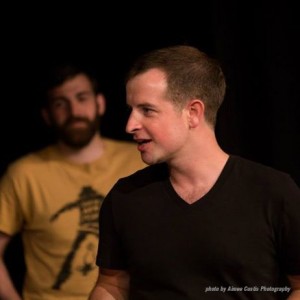
WIT Student Profile: Nick Seaver, from WIT@Work trainee to Harold graduate
Nick Seaver recently completed John Windmueller’s Level 5 Harold Class. Interestingly enough, Nick got his Improv start in one of John Windmueller’s WIT@Work trainings, thereby completing a John Windmueller-sized improv circle. By day, Nick is helping to make the world a better place, training a range of experts to communicate more effectively.
We decided to catch up with him, and see what he had to say about life, work, and the pursuit of improv!
Tell us a bit about your line of work.
I work at Burness, a public interest communications firm that helps experts and advocates share their work with the public and decision-makers. We only partner with nonprofits, foundations, and universities, and we help a wide range of people—from neuroscientists and environmental scientists to medical workers and community activists—tell their stories and affect social change. Ultimately, we’re helping experts who are working to make the world a little bit better.
What was your initial WIT@Work experience like?
I’m the co-director of training programs, so our team spends a lot of time developing new exercises and tools to help really smart people learn to talk about their work in ways that non-experts understand—and, ultimately, care about. We participated in WIT@Work to help us develop new activities to help experts bring more of themselves into their professional persona and to improve our own acting when we do roleplaying scenarios. I explained what we were looking for and WIT delivered. We brought together a team of trainers and company leaders for two hours and everyone left having had a good time. They were able to develop new ideas, and felt much more comfortable stepping outside their own comfort zone, which is what we make others do every day.
What drove you to actually sign up for an 8-week class?
I did theater in school and the WIT@Work workshop reminded me of how fun performing can be. I had about a day to decide if I wanted to start a class the next week, so I took the “yes, and…” lesson and figured there was nothing to lose.
Has your upper-level training developed any of the workplace skills cultivated in your initial WIT@Work workshop?
The full curriculum at WIT was hugely helpful in the workplace. Both for developing new approaches to training and, more broadly, it’s helped me be more cognizant of really listening and being constructive across the board. Everyday life is all about these basic skills and improv absolutely reinforces what we all know we should be doing in our professional and personal lives.
Of all the joys and discoveries that improv offers, which would you say is the most valuable?
I remember after my first WIT class we watched an interview where Tina Fey described how often she failed when she was at Second City, and that took off a lot of the pressure to do improv “right.” Failing and losing are uncomfortable—especially in a success-driven city like Washington—but improv helps you realize that a) it’s fine to fail and b) sometimes when you think you’re failing, it’s just building towards something unexpected. Improv changes the way you think about failing and risk-taking by making you more patient and trusting in your own (often kind of weird or slightly twisted) inner voice.
What would you say to someone considering a WIT class?
After my first session of classes, I was visiting home and within two hours my dad said something along the lines of, “Wow, those improv classes are paying off. You’re funny now.”
You, too, can receive these backhanded compliments if you take a WIT class.*
Seriously, though, I have a few friends who would be brilliant in improv who have yet to take the leap. Here’s my pitch: you’ll find a fun, interesting cross-section of DC, you’ll figure out a bunch of stuff about yourself, and you’ll stretch and see a lot of unexpected benefits in your life. Improv is partly about learning new skills and techniques and partly about undoing some lessons of growing up (e.g., self-censoring and questioning your instincts). Most importantly, it’s just fun.
*In fairness to my father, his exact wording may have been a bit less pointed, but he’s not alone in making these comments.
Unleash your creativity with a Foundations of Improv class at Washington Improv Theater! The fall term begins in Sept. 14 and classes are already filling up. Sign up for a class today—no experience required!